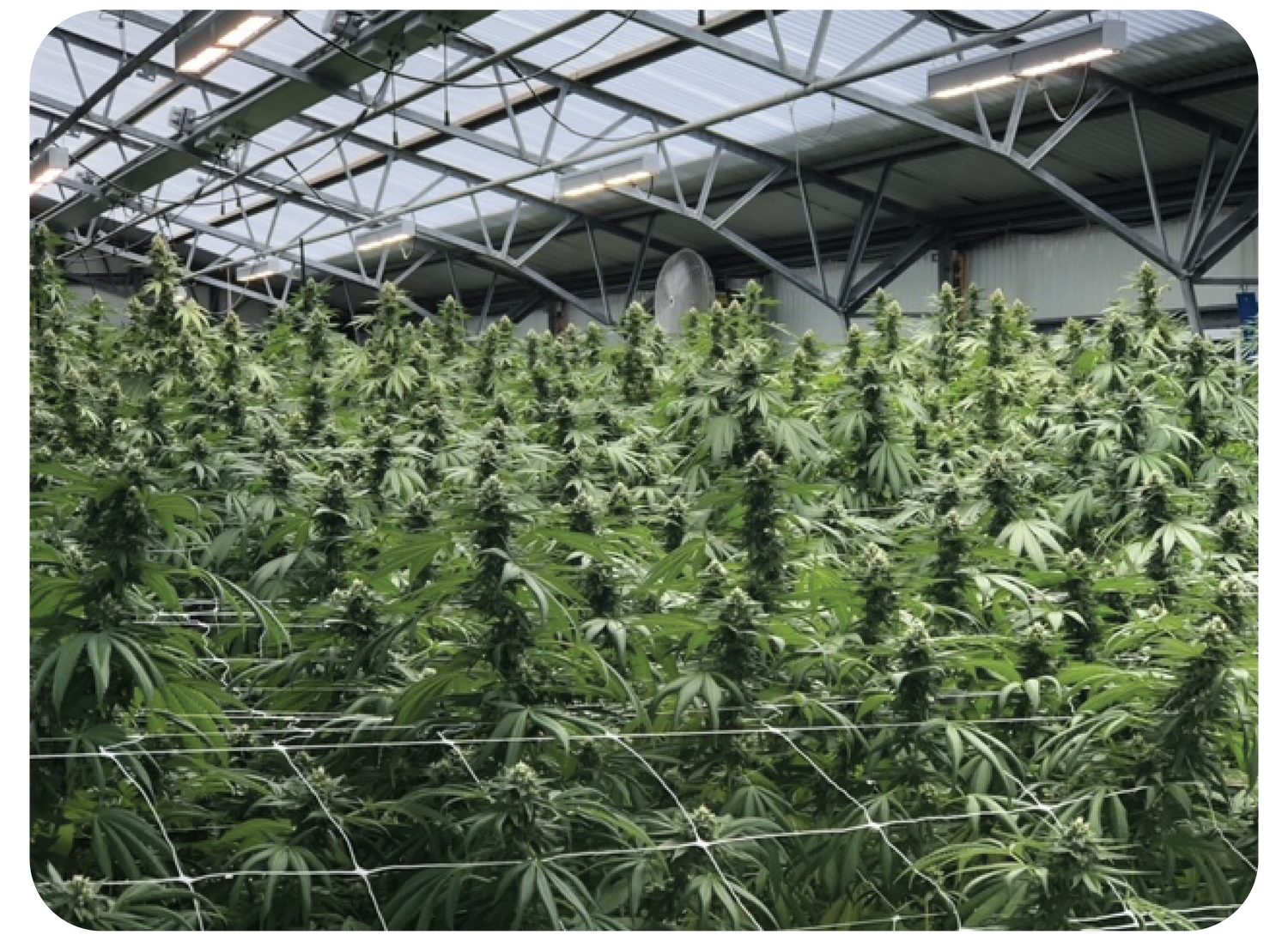Hemp University: A Complete Guide On CBD Oil
Table of Contents:[hide]
Photo: Dr. Greg Gerdeman
If you're like most people, you've probably been hearing a lot about CBD and hemp lately. You may have even seen CBD oil for sale at your local grocery store or pharmacy. But what is CBD, exactly? And is it legal? In this article, we'll take a closer look at all the finer details CBD and hemp, including their potential benefits and the differences between them. So if you're curious about this hot new health trend and you want a CBD for dummies look at CBD oil, keep reading!
What is hemp?
There is no reason to tiptoe around the truth... hemp is a form of Cannabis sativa, one of the first and most useful plants ever cultivated by humans! In fact, it is thanks to human agriculture that we have so many varieties of Cannabis, which can be grown for fiber, for nutritious seed, or for its fragrant and medicinal flower. Hemp was an important crop to our ancestors for all of these reasons!
Folks are often confused about what determines a variety of cannabis to be “hemp.” This is understandable, because the legal definition of today is not really based on historical or botanical uses for the term!
Hemp vs Cannabis
Historically, the terms hemp and cannabis were essentially interchangeable. European Cannabis sativa was cultivated for fiber and textiles — in fact, the name sativa literally means “useful.” Bred for centuries to serve such industrial purposes, hemp was selected to grow tall, strong stalks, not so much flowers as a source of medicine.
Over time, including a half century of cannabis prohibition, the term hemp became synonymous with fiber-producing Cannabis sativa. Traditional hemp produces sparse flowers containing very low amounts of phytocannabinoids... at least compared to traditional drug-producing varieties of cannabis that have been grown around the world as the source of marijuana, hashish and medicinal preparations. Also unlike cannabis grown as a drug, the flowers of hemp mainly produce CBD as their dominant phytocannabinoid, not THC.
Can hemp also produce full, phytocannabinoid rich flowers?
Absolutely!! In recent decades, traditional hemp varieties (with small flowers that are CBD dominant) have been interbred with traditional drug varieties (with larger, phytocannabinoid rich flowers that are THC dominant) to create modern types of phytocannabinoid rich, CBD-dominant hemp that are ideal for extracting into therapeutic oils without the “high.”
TN Farma only grows phytocannabinoid rich hemp to produce all natural, full spectrum CBD oils. The laws of today — most importantly the 2018 Farm Bill — distinguish legal hemp as being any variety that produces less than 0.3% THC by weight. What farmers know is that traditional “industrial” hemp, which is grown for fiber or nutritious seed, are pretty flimsy when it comes to producing desirable flowers! But the legal definition of hemp also includes varieties that have been bred to grow productive and medicinal flowers: fragrant, phytocannabinoid rich and CBD dominant! These kinds of hemp generate all the same therapeutic bouquet of bioactive components known to occur in Cannabis, but with only very low levels of THC naturally occurring. These amazing, phytocannabinoid-rich hemp varieties are 100% legal!
Types of CBD oils and extracts
Premium hemp cannabis flowers are both fragrant and sticky. This is thanks to resin-producing glands called trichomes, which cover the flower. This resin contains a rich diversity of health-supporting compounds like cannabinoids, aromatic terpenes and flavonoids.
Cannabinoids are oily by nature, so when extracted from hemp the resulting product is an oil. While some producers dissolve this extract into alcohol, we infuse it gently into a high quality coconut oil derivative called MCT (medium chain triglyceride) oil.
Broad vs Full Spectrum CBD Oils
The language around hemp oils is not so confusing once you learn it! Because of the unique nature of hemp and its strict regulation as a form of Cannabis, it is necessary to be very clear about how products from hemp are made, and how much THC they may contain, if any. That is the reason for the following terms:
- Full Spectrum CBD oils are extracts of hemp that contain all the medicinal components that can be effectively captured from the flower resin, including cannabinoids, terpenes and flavonoids. Because hemp contains small amounts of THC... no more than 0.3% THC... so does a full spectrum oil. In our Sleep tincture, this amounts to no more than 3 mg THC per 1 mL dropper.
- Broad Spectrum CBD oils are extracts of hemp that contain ZERO THC. The low amount of THC that naturally occurs in hemp has been carefully removed. For those who wish to completely avoid THC for whatever reason, broad spectrum oils allow consumption of a natural entourage of hemp biomolecules without any THC.
- CBD Isolate refers to cannabinoids or terpenes that are added as purified ingredients. Cannabinoid isolates like CBD or CBN are derived from hemp (although some companies are beginning to create them from non-plant sources like genetically engineered yeast — not ours!). Terpenes have long been cleanly isolated within the pure essential oils of many different natural plants. We source only premium, steam-distilled natural terpenes. Using our extensive scientific knowledge of the therapeutic profiles naturally found in Cannabis, we formulate proprietary terpene blends that supplement our broad- and full-spectrum oils to ensure predictability and maximize their desired effect and flavor.
Hemp Glossary Terms
How does phytocannabinoid rich hemp oil work?
Hemp (Cannabis sativa) is a marvel of the natural world, a unique plant that can be used for fiber production, highly nutritious seeds and as a source of botanical medicines.
Whereas hemp seeds are responsible for producing hemp seed oil, which is rich in healthy polyunsaturated fatty acids, CBD and other botanically active components come from tiny glands that cover the plant’s sticky flowers. Extracting the resin from these glands is a science and an art.
The resulting hemp flower extracts contain a remarkable trifecta of health-promoting botanicals called: cannabinoids, flavonoids and terpenes. Flavonoids (also called polyphenols) and terpenes are common all over the plant world, whereas cannabinoids are special creations of the Cannabis genus.
Cannabinoids
CBD (cannabidiol) — It is hard to believe that CBD has only recently become popular by name, since it has always been a primary bioactive component of the hemp subtypes of cannabis, one of humanity’s longest cultivated medicinal plants. CBD is by far the most prominent part of the resin created in the glandular trichomes of hemp flower. Curated by our CEO and CSO, the sun- and soil-fed hemp flowers grown for TN Farmaceuticals often contain as much as 20% CBD by dry weight.
How does CBD work?
In short, CBD interacts with a variety of well known cellular targets that regulate homeostasis — a term that refers to maintaining balance. By prolonging the action of the body’s own endocannabinoid molecules, CBD may enhance the activity of the body’s endocannabinoid system (ECS), which is believed by scientists to be a “master regulator” of physiological balance and wellness.
These are just some of the complex actions that make up the pharmacology of CBD. Perhaps you have wondered: how can CBD do so many things? While there is much yet to learn, our team has studied the science of cannabinoids for decades, and we believe that there are strong biological rationales for incorporating CBD into your wellness regimen.
CBDA (cannabidiolic acid) — CBDA is the “raw” form of CBD, as it is naturally produced in the hemp plant. It is converted to the more familiar CBD molecule over time, and this process occurs quickly when exposed to heat during extraction and distillation to make most phytocannabinoid-rich hemp oils. However, CBDA has actions of its own that may compliment CBD.
THC (tetrahydrocannabinol) — THC is the most famous cannabinoid, being the much more psychoactive sister molecule of CBD. THC is primarily responsible for the “high” caused by THC-dominant cannabis flower (also known as marijuana). In hemp the cannabinoid content is CBD-dominant, producing very little THC.
In fact, the level of THC produced by the plant is what determines if it is legally considered to be hemp, as opposed to other types of cannabis. This has not always been the case. Indeed, “hemp” is a name that has been used for hundreds of years! Today, however, if a farmer wishes to grow hemp for any of its many purposes, the legal status of the crop under U.S. federal law is solely determined by THC content... which must be no greater than 0.3% by dry weight.
Is THC a bad thing?
Of course not, but it is potently psychoactive and is prohibited by federal law except when it is synthesized as a FDA-approved medication! Regardless, 35 states have legalized THC-rich cannabis for medicinal purposes, with half of those also allowing non medical use by adults. This does not yet include our home state of Tennessee.
THC mimics the ECS by acting on CB1 and CB2 cannabinoid receptors in a manner very similar to the body’s own endocannabinoids. Our Sleep Botanical Tincture — and other full spectrum hemp products in development — contains the 0.3% THC allowable under federal law. This means that in every 1 mL dropper, there will be up to 3 mg THC. We believe this to be of great value as it acts alongside CBD and the other botanicals to create an enhanced “entourage effect.”
At Tennessee Farmaceuticals we are very aware that many folks are cautious about THC, and may need to avoid it altogether. This is why right from the start we have created our Calm and Relief Botanical Tinctures. These broad spectrum hemp extracts are formulated to contain zero THC.
THCA (tetrahydrocannabinolic acid) — THCA is the “raw” form of THC, as it is naturally produced in the hemp plant. It is converted to the more familiar THC molecule over time, and this process occurs quickly when exposed to heat during extraction and distillation to make most phytocannabinoid-rich hemp oils. However, THCA has actions of its own that may contribute to an overall entourage effect of full spectrum hemp products.
CBN (cannabinol) — Cannabinol is a cannabinoid that acts at cellular CB1 receptors in ways that are similar to THC, but with only a fraction of the potency.
Where does CBN come from?
Did you know CBN was the very first cannabinoid to have been identified and named? CBN is formed as other less stable cannabinoids break down, oxidizing over time. For this reason it naturally occurs at low levels in sun ripened cannabis (including hemp), and tends to slowly increase after the plant has been harvested. It is likely that CBN has always been around as a component of cannabis-based medicines. Traditional preparations of phytocannabinoid-rich hemp, which were once a mainstay of doctors’ medicine cabinets, would accumulate CBN as a result of storage, possibly enhancing a sleep-promoting effect. These days we simply reproduce the natural breakdown reaction in a lab environment. Following best practices and international standards of hygiene and quality, our chemists create pure CBN from natural hemp extracts so that our Sleep Botanical Tincture is always consistent.
Our Team
The world is witnessing a phenomenal global resurgence in hemp! Although hemp is a plant with an incredible number of uses, it is excitement for CBD and other cannabinoids that is largely driving the market.
With such booming interest it is certain that consumers looking to add CBD to their wellness regimen will have many options! Unfortunately, too many products are high on hype, but low on quality and consistency.
We will always give you the same advice we give our own families. Identify reliable hemp CBD products you can trust, produced by experts whose values and knowledge are represented by experience and action, not just words on a web site.
Not only is our founder an organic farmer, he is a former mayor and serial CEO who combines a love for business innovation with a passion for promoting wellness and sustainable living.
Our Chief Scientist traces his ancestry to a family of Scotch-Irish farmers who grew hemp in northern Kentucky over 200 years ago! But his accomplishments and broad knowledge of hemp cannabinoids and their benefits for human health and wellness are cutting-edge modern.
How do natural hemp flower extracts work in the body?
Certainly CBD is part of the answer, but it’s not everything. So what else is in hemp besides CBD?
First, we have to back up a little bit to ask: what is hemp?
Like all varieties of cannabis, we grow hemp that is rich in therapeutic bioactive compounds that are believed to be therapeutic and health-promoting. Produced by resin-filled trichome glands that cover the mature hemp flower, these compounds fall into three primary categories: cannabinoids, terpenes and flavonoids.
Cannabinoids
Terpenes
The natural world is a sensory experience. The smell of flowers, of pine trees in the forest, or even cut grass in the summer... most of these airborne aromas are mediated by a large family of volatile compounds called terpenes.
Plants use terpenes not only as building blocks for their metabolism, but as a means of chemical communication! Many terpenes are used to attract beneficial pollinators — some even improve their memory — while at the same time deterring pest bugs and the growth of bacteria or other microorganisms!
Humans also have an innate appreciation of floral fragrances and spices, and this is because of those same terpenes! From perfumes to culinary herbs, there are many terpene rich plants that we seek out for sensory experience and therapeutic effect. Quests for desirable terpenes have often shaped human history!
The hemp plant is a wonderful source of terpenes! The potent and pungent smells of cannabis are legendary, and hemp has them too! (Did you know that cannabinoids like THC and CBD have no smell?)
When it comes to the benefits of hemp, “the nose knows!” Terpenes are created by many plants in nature, but something seems special about the way that they work in combination with cannabinoids. Different “strains” or varieties of cannabis not only smell differently, but effect us differently as well. This is because of unique ensembles of cannabinoids and terpenes, combining to create what is often called the “entourage effect” of this medicine plant.
What terpenes are in TN Farmaceuticals Botanical Tinctures?
We have leveraged decades of study on the pharmacology of hemp to identify combinations of terpenes that are especially suited for different needs. Our botanical tinctures replicate the terpenes found naturally in our phytocannabinoid-rich hemp varieties, which we supplement in careful combination using natural, plant-derived terpenes so that TN Farma Botanical Tinctures are reliable and consistent in potency. `
Our tinctures are 3rd party laboratory tested to guarantee there are 100 mg of natural terpenes within every 1 oz bottle!
The magic of terpenes arises in their combination! As aromatherapists know, even tiny amounts of terpene-rich essential oils can have effect. Likewise, even tiny additions to a terpene-cannabinoid blend can change the flavor and overall therapeutic entourage effect.
Our Botanical Tinctures contain numerous terpenes formulated in proprietary blends to support specific uses. Here are introductions to some of the more prominent terpenes you will experience in our tinctures.
Beta caryophyllene (found in Relief, Calm and Sleep Botanical Tinctures)
β-caryophyllene (BCP) is a terpene found in spice plants like coriander, cumin and black pepper. These are dietary ingredients that add more than just flavor! As a gentle activator of our body’s CB2 cannabinoid receptors, BCP has even been called a dietary cannabinoid.
Beta pinene (Relief)
If you know the woodsy scent of walking among pine trees, you have experience with β-pinene. Produced by conifers as well as many flowering plants, the two forms of pinene (α-pinene and β-pinene) are believed to be the world’s most prevalent terpenes and can be found in cumin, hops and a variety of other medicinal and spicy herbs.
d-Limonene (Calm, Relief)
Limonene is also very recognizable as the primary component of the essential oil of oranges and other citrus fruits. Highly bioavailable, limonene has antibiotic properties and is reputed to offer several possible benefits, some of which is supported by scientific research.
Calm
Terpinoline (Calm)
found in both pines and flowering plants including cannabis. Prominent in some popular classic cannabis varieties like Train Wreck, Jack Herer and others.
Humulene (Calm)
an important component of hops.
FAQs
CBD Frequently Asked Questions
CBD is the fast growing natural health supplement in the market. Here are some of the most frequent questions we get regarding CBD.
CBD, or cannabidiol, is a chemical compound found in the cannabis plant. CBD does not cause any psychoactive effects or induce feelings of intoxication. Instead, it is known for its many medicinal properties. Studies have shown that CBD can help to relieve pain and inflammation, soothe anxiety and depression, reduce symptoms of certain neurological disorders, and even prevent the growth of certain types of cancer cells. Hence, for many people around the world, CBD has become a valuable and effective tool for improving health and wellbeing. Whether you are seeking a natural alternative to pharmaceutical medications or simply looking for a way to support overall wellness, CBD is definitely worth considering.
Hemp is a form of Cannabis sativa, one of the first and most useful plants ever cultivated by humans! In fact, it is thanks to human agriculture that we have so many varieties of Cannabis, which can be grown for fiber, for nutritious seed, or for its fragrant and medicinal flower. Hemp was an important crop to our ancestors for all of these reasons!
Yes! The laws of today — most importantly the 2018 Farm Bill — distinguish legal hemp as being any variety that produces less than 0.3% THC by weight. Is CBD Legal
No. There is no "high" or euphoric impact from taking hemp-derived CBD because CBD is a non-intoxicating component of hemp plant, which legally must have less than 0.3 percent Tetrahydrocannabinol (THC).
CBD's properties differ from person to person, based on height, weight, and the amount of CBD consumed. There is no "high" effect with CBD oil because it contains no psychoactive components; start with small doses and progressively increase with each use until you achieve the desired outcomes.
Because everyone's body is different, it's tough to come up with a standard measurement that works for everyone. We recommend testing half a vile of our sleep formula to start then move to a full vile. Make sure to take it 30 mins before bedtime.
You may enjoy...
-
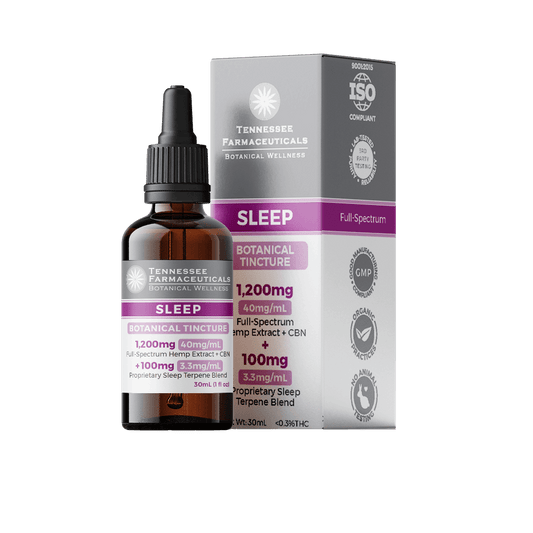 Sold out
Sold outSleep - Full Spectrum CBD Oil
Regular price $39.99Sale price $39.99Unit price perSold out -
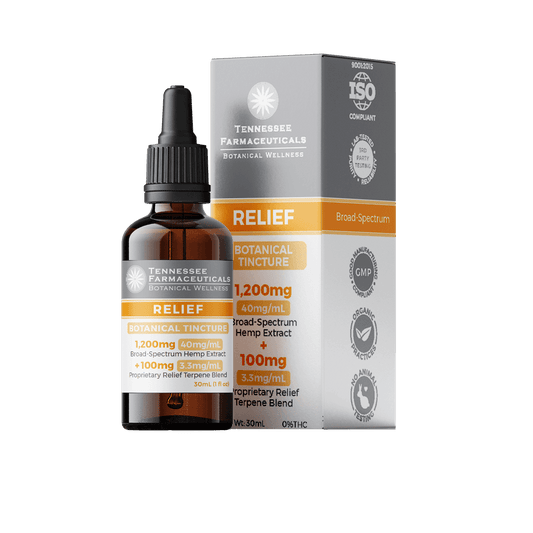 Sold out
Sold outRelief - Broad Spectrum CBD Oil
Regular price $39.99Sale price $39.99Unit price perSold out -
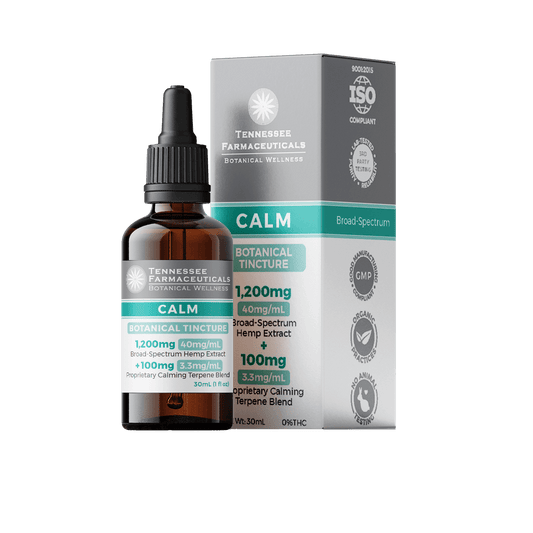 Sold out
Sold outCalm - Broad Spectrum CBD Oil
Regular price $39.99Sale price $39.99Unit price perSold out -
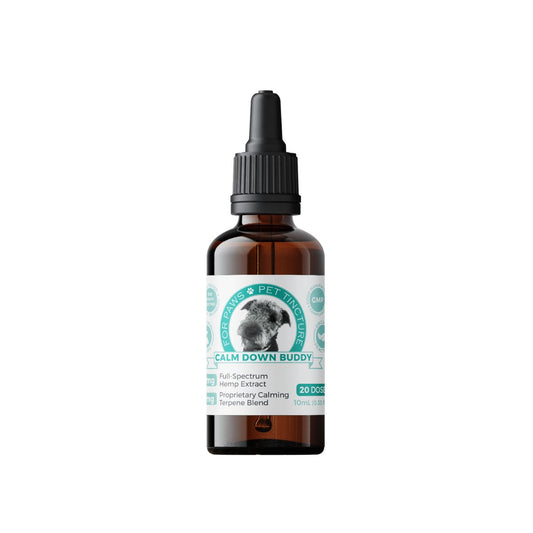 Sold out
Sold outCalm Down Buddy - Pet Tinctures
Regular price From $24.99Regular priceUnit price per$24.99Sale price From $24.99Sold out

